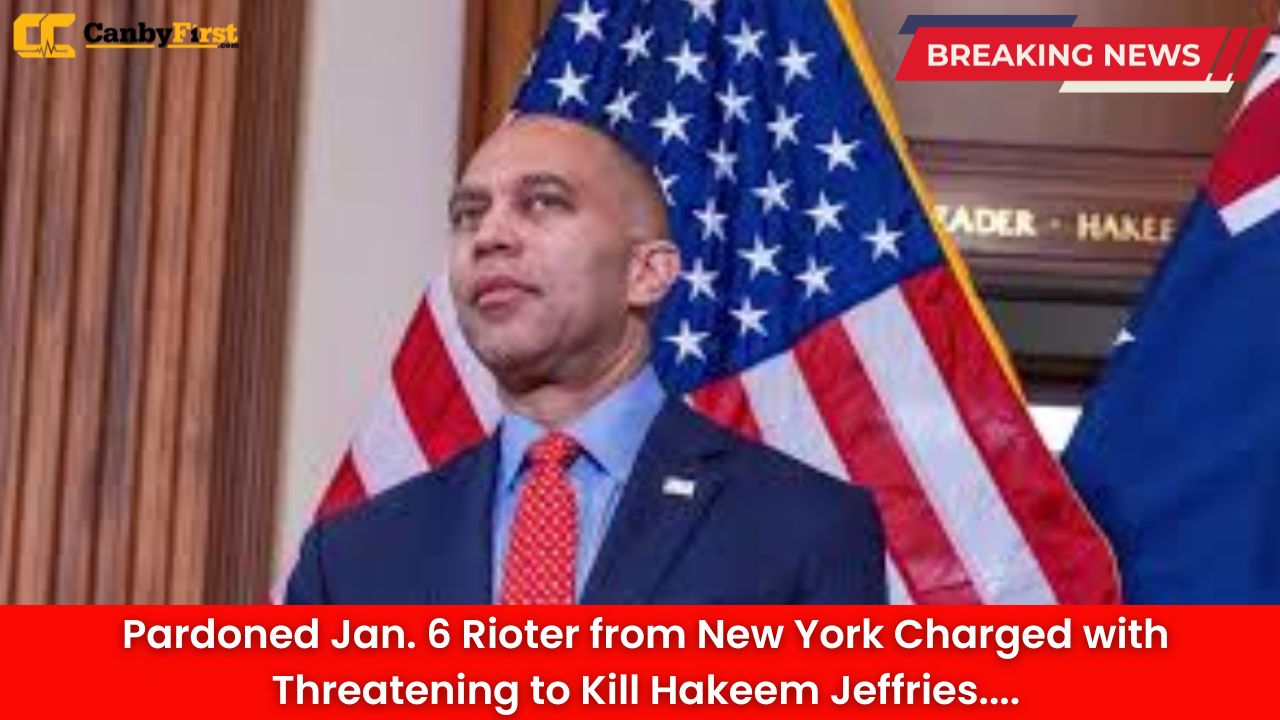New York, US:
A New York man who was previously pardoned for his involvement in the January 6, 2021, U.S. Capitol riot has again found himself in legal trouble—this time accused of issuing violent threats against House Democratic Leader Hakeem Jeffries. Federal prosecutors charged 47-year-old Daniel McCormick of Long Island with making interstate threats and attempting to intimidate a member of Congress, reigniting national debate over post-pardon accountability and political extremism.
According to a federal indictment unsealed Wednesday, McCormick sent multiple threatening messages to Jeffries’ Brooklyn office earlier this month, allegedly threatening to “take him out” and warning of future violence if Jeffries “continued betraying America.” Investigators said the threats were grave enough to trigger a full federal security assessment and a law enforcement response at the House minority leader’s local district office.
Also Read
FBI Investigation and Arrest
The FBI arrested McCormick Tuesday morning at his home in Suffolk County following a short surveillance operation. Authorities reported finding several firearms and “potentially dangerous items” in his residence despite his previous conviction and restricted access to weapons. Agents noted that McCormick had become “increasingly radicalized” online in the months leading up to his arrest, frequently engaging in extremist political chat groups and spreading conspiracy theories targeting Democratic lawmakers.
According to court documents, McCormick had been under federal supervision after receiving a presidential pardon in 2023 for his role in the Capitol riot. At that time, he had expressed public gratitude for his “second chance,” telling reporters he wanted to move on from politics and rebuild his life. The new charges, however, paint a starkly different picture.
Court Appearance and Charges
McCormick appeared in federal court in Central Islip on Thursday, where prosecutors requested that he be detained pending trial. The judge ordered him held without bail, citing both the seriousness of the threats and his prior criminal record.
He is charged with one count of threatening a federal official and one count of transmitting threats across state lines—both felonies that could carry up to 15 years in prison if convicted. Assistant U.S. Attorney Maria Chen told the court that McCormick’s actions represented a “clear danger to public safety and the democratic process.”
McCormick’s defense attorney, Paul Henders, entered a plea of not guilty on his behalf and argued that his client’s messages were “political hyperbole, not direct threats.” He also emphasized McCormick’s recent struggles with mental health and unemployment, claiming the case had been “overblown for political optics.”
Reaction from Hakeem Jeffries and Congress
Representative Hakeem Jeffries (D–NY), who serves as House Minority Leader, issued a brief statement expressing gratitude for law enforcement’s swift action and reaffirming his commitment to public service despite ongoing threats.
“I will never be intimidated by violence or the politics of hate,” Jeffries said. “Public officials have a responsibility to stand strong for democracy, even when confronted with danger.”
Lawmakers from both parties have voiced concern about the rise in threats targeting members of Congress in recent years. According to data from the U.S. Capitol Police, thousands of such threats are reported annually, with a growing proportion tied to online radicalization and partisan misinformation.
Political and Public Repercussions
The case has quickly become a political flashpoint, given McCormick’s history and presidential pardon. Critics argue that his case underscores the consequences of pardoning individuals involved in politically motivated violence. Supporters of the pardon process, however, maintain that isolated cases shouldn’t define the broader intent to offer clemency and reconciliation.
Several advocacy groups have called for expanded oversight of individuals who receive pardons for politically charged crimes, suggesting post-pardon evaluation programs and stricter monitoring for signs of extremist behavior.
White House officials have not commented on McCormick’s new charges, though sources familiar with law enforcement coordination indicated that the Department of Justice is treating the case as part of its continuing crackdown on threats to public officials.
A Pattern of Post-Pardon Violence
McCormick’s arrest adds to a growing list of former Capitol rioters who have reoffended or been charged with new crimes after release or pardon. Analysts say this pattern reflects the underlying ideological fervor that continues to linger among portions of the January 6 cohort.
Former FBI counterterrorism expert Dana Walden noted, “Pardons don’t erase extremist belief systems. Without de-radicalization interventions, it’s only a matter of time before some individuals re-engage in threatening or violent activity.”
According to the indictment, McCormick had previously boasted online about being “untouchable” after his pardon. Federal authorities now cite that rhetoric as evidence of his belief that political affiliation could shield him from accountability—a perception the DOJ aims to confront decisively through prosecution.
What Comes Next
McCormick remains in federal custody and will face a detention hearing next week. His next court date is scheduled for November 6. Prosecutors plan to present additional digital evidence, including audio messages and social media posts, that they say demonstrate a “calculated intent to intimidate.”
Meanwhile, security measures around Jeffries’ district offices in Brooklyn and Queens have been heightened. New York Police Department units, working with Capitol Police, have increased patrols and installed temporary barriers outside the offices following the incident.
As the legal battle unfolds, the case is likely to intensify ongoing debates surrounding political violence, extremism, and the boundaries of the pardon power in a polarized nation.
Frequently Asked Questions
Who is Daniel McCormick?
Daniel McCormick is a 47-year-old man from Suffolk County, New York, who participated in the January 6 Capitol riot. He was pardoned in 2023 but is now facing new federal charges.
What is he accused of doing?
He allegedly threatened to kill or harm House Minority Leader Hakeem Jeffries through multiple messages sent earlier this month.
What penalties could he face?
If convicted, McCormick could face up to 15 years in federal prison for the combined charges.
How has Hakeem Jeffries responded?
Jeffries thanked law enforcement for their quick action and said he will not be deterred by threats or intimidation.
What happens next?
McCormick is scheduled for a detention hearing next week. His case will proceed to trial later this year or early 2026, depending on the discovery process.












